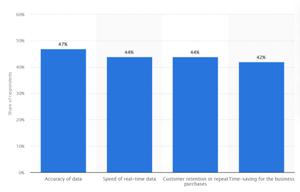AI-Driven Personalized Product Recommendation: Use Cases and Benefits
Sector: AI + Data
Author: Nisarg Mehta
Date Published: 09/25/2024

Contents
The use of AI in creating personalized shopping experiences has revolutionized the retail industry. Specifically, AI recommendation engines have proven to enhance customer loyalty, and on average, contribute to 44% of overall repurchase rates across the world.

And that’s why, companies need to fine-tune their customer engagements to deliver value. To do this, the latest AI technologies can be used to develop recommendation systems that can show certain products to certain customers at certain times. This not only improves customer satisfaction but also contributes to the growth of the business.
What is an AI recommendation system? —Now, let us look at some of the reasons why these systems are so effective.
What is an AI-Powered Product Recommendation System?
A recommendation system is an application that uses artificial intelligence to present products to customers based on the customers’ activities. These systems employ data such as the history of browsing, buying, and preference to sell products of interest. Having some idea of the customer’s likes or needs, the system can present products that are more likely to be sold.
This type of recommendation system is intelligent and operational and uses customer data to make recommendations on the fly. From offering products similar to those the customer has been buying to determining what the customer may want to buy next, recommendation systems that are based on Artificial Intelligence are employed to enhance the customer experience and boost revenue.
There are several types of AI recommendation systems, each offers unique approaches to suggest products:
- Content-based Recommendations: This approach recommends products that are related to those customers have purchased or viewed. It works by identifying the characteristics of the items the customer has liked and suggesting other items with similar characteristics.
- Collaborative Filtering: It is another technique that is used to study the behavior of several users with the same interest. It recommends products to the consumer based on what similar customers have purchased or viewed, which helps find new products.
- Hybrid Systems: Hybrid systems that incorporate both content-based recommendations and collaborative filtering are the most effective. Thus, such systems can offer more versatile and precise recommendations thanks to the integration of different data sources.
All these recommendation systems are very important in enhancing the customer experience by providing the customer with suggestions that are versatile, yet appropriate for the customer.
Popular Use Cases of AI-based Product Recommendation Systems
AI-powered product recommendation systems have become powerful tools that have revolutionized how customers are engaged across various industries.
eCommerce Product Suggestions
eCommerce giants like Amazon employ AI in tracking the behavior of customers including their interaction history, past orders, and even the time they spend on a certain product. The system then suggests items that are most closely related to each user. This can be implemented on the product page, search result page, or at the checkout process so that consumers are constantly exposed to relevant products, therefore increasing their interest, and in turn, their sales.
Upselling and Cross-selling
AI recommendation systems play a critical role in boosting revenue by upselling (convincing consumers to buy a more expensive item) and cross-selling (offering related products).
For instance, if a customer has put a phone into the cart, they may be recommended to buy a cover or a better version of the phone. Suggested products at the right time and in the right context can go a long way in increasing the AOV of a business without being overbearing.
Real-time Personalization
Another advantage that comes with AI recommendation systems is that they can alter the recommended items in real time. For instance, when a client is shopping, the system captures and processes the data in real time to provide the best recommendations.
For example, suppose a user starts searching for a new product category, such as electronics; the system can respond proactively and recommend more items within this category, which improves the user experience and increases sales.
Content Streaming Platforms
Platforms like Netflix and Spotify prominently use AI-based recommendation systems. These platforms use data about customers’ preferences, including the shows or songs they have previously watched or listened to, and compare it with the actions of other users.
Consequently, these systems provide the users with such features as ‘Because you watched…’ or playlists such as Spotify’s ‘Discover Weekly.’ These are important in retaining the user and ensuring they keep coming back to the platform.
Online Grocery Stores
In the grocery business, AI is used on online platforms to make it easier for users by suggesting products that they may have bought before. For instance, an AI system may recommend that a customer buys more milk or eggs given their previous purchasing behavior.
Also, the system might suggest other seasonal or related products based on the customer’s frequent purchases to make the shopping process more convenient for the customer and increase the chance of repeat business.
Fashion and Apparel Recommendations
Fashion eCommerce is using AI to recommend clothing and accessories to consumers based on their past actions. This includes reviewing their past purchase history, their preferred brands, and the products that are currently popular on the platform.
For instance, a system may provide an entire set of clothes based on the current fashion trends or shoes that would go well with a dress that the customer previously viewed. This greatly enhances the experience of the customer when shopping since they are being provided with products related to their interests.
Travel and Hospitality
AI is also implemented in the travel and hospitality industries. Travel websites such as Expedia or Booking.com are the prime examples of this. These travel companies use AI to suggest certain travel packages, hotels, or flights depending on a user’s search history, bookings, or interests.
For instance, if the user frequently searches for beaches, the platform will suggest similar locations or promotions for the next vacation. This not only improves the booking experience but also leads to customer retention by providing recommendations that suit the customer’s preferences.
Healthcare
In healthcare, AI Recommendation Systems are being applied to tailor treatment and health suggestions. For example, certain healthcare applications incorporate AI to suggest exercises or diets given the user’s health profile, such as their fitness objectives, past health complications, or level of physical activity. This level of personalization can help greatly improve patient participation and results by providing individualized care advice.
Education
AI is playing a crucial role in the education sector by enabling learners to have individualized experiences. E-learning services like Coursera and Udemy employ recommendation algorithms to present course options, learning trajectories, or other learning materials depending on learners’ histories and preferences. This assists learners in identifying correct courses that may be relevant to their career paths or their interests, hence enhancing their learning experience.
Financial Services
In financial services, AI recommendation systems can be used to offer recommendations on investment or other financial planning. For instance, financial institutions can determine the customer’s spending pattern, income, and financial objectives to provide suitable products or services for each of them, thus allowing businesses to provide the right financial products. This way, they can suggest the best savings accounts, credit cards, or investment options based on a user’s behavior and objectives.
Advantages of using AI in Recommendation Systems
It is clear that recommendation systems are beneficial for businesses and when combined with AI, they can improve the customer experience and revenue. Let’s explore the top benefits of using AI recommendation systems:

Increased Customer Engagement and Retention
This is where the concept of personalization comes in, and it is quite vital to keep the customers engaged. the use of AI in recommendation systems can help improve customer retention since customers are presented with the right products or services. Research indicates that AI-based personalization improves the frequency of repeat purchases by 44% across the globe. This helps in customer retention since the customers are likely to come back when they are recognized.
Higher Conversion Rates
By suggesting products that the customer is interested in, the AI system increases the likelihood of the customer making a purchase. These systems are convenient since they display to customers the products they are likely to buy, thus improving conversion rates. It is for this reason that companies that have implemented recommendation systems based on personalization usually experience a tremendous boost in sales.
Improved Customer Satisfaction
Customers find it easier to make a decision when they are given product recommendations that are relevant to their preferences. This not only enhances the satisfaction of the customers but also minimizes the rate of cart abandonment.
Enhanced Operational Efficiency
Al systems can process vast amounts of data and make recommendations with the use of algorithms. This means that businesses can engage in other activities while the product recommendations are being made, thus conserving time and energy.
Increased Average Order Value (AOV)
Upselling and cross-selling strategies used by AI recommendation systems help the customer purchase more products. For instance, recommending related products or premium products at the time of payment can help increase the average order value. This not only increases sales but also enhances the value of each customer transaction.
Better Customer Insights
The insights from user preference and engagement can be helpful to businesses in order to learn more about their consumers, tailor their advertising efforts, and enhance their products. These insights help companies design better marketing strategies and provide relevant promotions to customers.
Some Guidelines for SMES That Are Just Getting into AI
It may seem like implementing AI recommendation systems for small to medium-sized businesses is a daunting task, but it is not.
Start Small and Scale Gradually
Do not attempt to build a sophisticated AI application in a single go. Begin with simple recommendation systems that are simple to implement within your current framework. Shopify and many other eCommerce platforms provide pre-integrated AI features that make it easier to begin the process without a huge expenditure. After you collect enough data and witness the results, you can slowly increase the level of AI and include more complex models.
Leverage Existing AI Tools
Utilize the pre-existing AI tools that are accessible through third-party applications. Some of the most common AI-based recommendation platforms for small businesses are affordable and simple to implement. These tools help you get started without having to build a team of data scientists from scratch.
Focus on Collecting Customer Data
The performance of an AI recommendation system is, therefore, a function of the quality and quantity of customer data. Ensure that you are capturing customer preferences, browsing history, and purchase behavior. This data will help your AI system to give precise and relevant suggestions which will enhance customer satisfaction and hence enhance sales.
Test and Optimize Regularly
It is essential to test and fine-tune your AI-based recommendation system regularly. AI models get better as they are exposed to more data but it is crucial to evaluate the outcomes and tweak the model when needed. Experiment with different recommendation techniques to find out which one is most effective for your audience and always improve the system so that it produces the best results.
Invest in Customer Experience
It is important to always remember that the recommendations aim to improve the customer experience. Pay more attention to providing relevant and valuable interactions that enhance the shopping experience of the customer. In this way, you will not only enhance customer loyalty but also enhance the relationship with your audience.
Lastly, Pick the Right AI Partner for Your AI Endeavor
To get the best results and avoid common pitfalls when using AI-based recommendation systems, it is crucial to select the right partner. We, at Techtic Solutions, with our knowledge in eCommerce development and AI, can assist a wide range of companies in implementing an effective product recommendation system into their online store.
So, whether you are a small business that is just beginning its integration of AI or an enterprise that wants to expand its use of technology, feel free to reach out to our AI experts.



